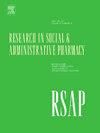Artificial intelligence (AI) in pharmacovigilance: A systematic review on predicting adverse drug reactions (ADR) in hospitalized patients
IF 3.7
3区 医学
Q1 PUBLIC, ENVIRONMENTAL & OCCUPATIONAL HEALTH
Research in Social & Administrative Pharmacy
Pub Date : 2025-02-12
DOI:10.1016/j.sapharm.2025.02.008
引用次数: 0
Abstract
Introduction
Adverse drug reactions (ADRs) significantly impact healthcare systems, leading to increased hospitalization rates and costs. With the growing adoption of artificial intelligence (AI) in healthcare, machine learning (ML) models offer promising solutions for ADR prediction. However, comprehensive evaluations of these models remain limited.
Methods
This systematic review synthesized findings from 13 studies that utilized various ML algorithms (regression-based, flexible, and ensemble models) to predict ADRs using data such as patient demographics, laboratory values, and comorbidities. Meta-analysis was conducted to assess the pooled sensitivity and specificity of the models, and a co-authorship and keyword analysis was performed to examine collaborative networks within the field.
Results
The included studies primarily focused on model development (77 %), with only 23 % incorporating external validation, raising concerns about generalizability across clinical contexts. Meta-analysis showed pooled sensitivity and specificity of 78.1 % and 70.6 % for development-only studies, while studies with external validation achieved higher sensitivity (81.5 %) and specificity (79.5 %). Co-authorship analysis identified 67 contributors across eight collaboration clusters, indicating a specialized but emerging research field.
Discussion
The findings highlight the need for multifactorial models that integrate diverse predictors to improve the performance and reliability of ML-based ADR prediction. Addressing these limitations through rigorous model development and validation processes could enhance the clinical applicability of AI-driven pharmacovigilance, ultimately advancing patient safety and healthcare outcomes.
人工智能(AI)在药物警戒中的应用:住院患者药物不良反应(ADR)预测的系统综述
药物不良反应(adr)严重影响医疗保健系统,导致住院率和费用增加。随着人工智能(AI)在医疗保健领域的日益普及,机器学习(ML)模型为ADR预测提供了有前途的解决方案。然而,对这些模型的综合评价仍然有限。方法:本系统综述综合了13项研究的结果,这些研究利用各种ML算法(基于回归的、灵活的和集成模型),利用患者人口统计学、实验室值和合并症等数据预测adr。进行meta分析以评估模型的综合敏感性和特异性,并进行共同作者和关键词分析以检查该领域内的合作网络。结果:纳入的研究主要集中在模型开发上(77%),只有23%纳入了外部验证,这引起了对临床背景下的普遍性的担忧。荟萃分析显示,仅发育研究的敏感性和特异性分别为78.1%和70.6%,而外部验证研究的敏感性和特异性更高(81.5%)和79.5%。共同作者分析确定了来自8个合作集群的67位贡献者,表明这是一个专业但新兴的研究领域。讨论:研究结果强调需要多因素模型,整合不同的预测因子,以提高基于ml的ADR预测的性能和可靠性。通过严格的模型开发和验证过程来解决这些局限性,可以增强人工智能驱动的药物警戒的临床适用性,最终提高患者安全和医疗保健结果。
本文章由计算机程序翻译,如有差异,请以英文原文为准。
求助全文
约1分钟内获得全文
求助全文
来源期刊

Research in Social & Administrative Pharmacy
PUBLIC, ENVIRONMENTAL & OCCUPATIONAL HEALTH-
CiteScore
7.20
自引率
10.30%
发文量
225
审稿时长
47 days
期刊介绍:
Research in Social and Administrative Pharmacy (RSAP) is a quarterly publication featuring original scientific reports and comprehensive review articles in the social and administrative pharmaceutical sciences. Topics of interest include outcomes evaluation of products, programs, or services; pharmacoepidemiology; medication adherence; direct-to-consumer advertising of prescription medications; disease state management; health systems reform; drug marketing; medication distribution systems such as e-prescribing; web-based pharmaceutical/medical services; drug commerce and re-importation; and health professions workforce issues.
 求助内容:
求助内容: 应助结果提醒方式:
应助结果提醒方式:


